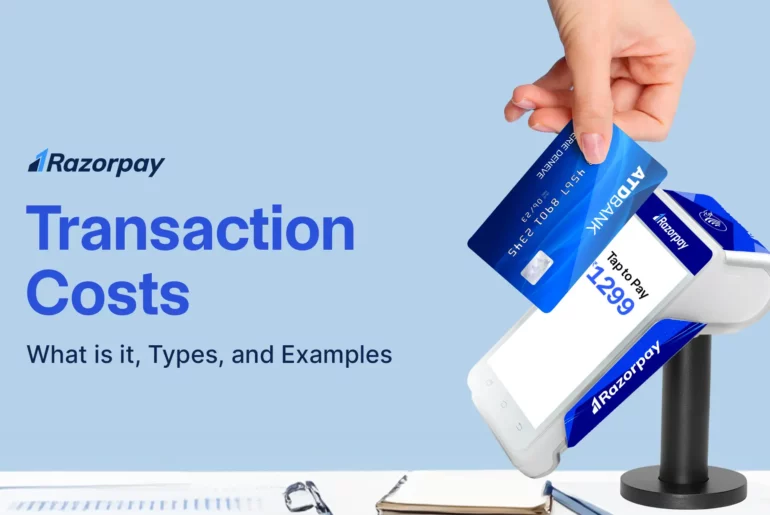Table of Contents
What are Transaction Costs?
Transaction costs are the fees incurred each time a transaction takes place, whether buying, selling, or transferring assets. These fees can either be a percentage of the transaction amount or a fixed dollar amount, depending on the service or platform. Understanding this distinction is crucial, especially when evaluating what your broker or financial service provider offers. The structure of these fees can significantly influence the overall cost and impact the profitability of your transactions.
How Transaction Costs Work?
Transaction costs are the expenses incurred when participating in various financial activities, such as buying or selling goods, trading securities, or transferring funds. These costs are embedded in the process and can vary depending on the type of transaction, the involved parties, and the medium through which the transaction is conducted.
Here’s how transaction costs typically work in different scenarios:
Buying and Selling Goods
When purchasing goods, transaction costs can include taxes, shipping fees, and any additional charges for payment processing. Sellers might also face costs related to advertising, payment gateways, and delivery.
Trading Securities
Investors incur transaction costs like brokerage fees, which are often a percentage of the trade value or a flat fee per transaction. In addition, there may be costs related to the bid-ask spread, where the price difference between buying and selling a security affects the overall cost.
Fund Transfers
When transferring money, transaction costs might include service fees, currency conversion charges, or wire transfer fees. These costs can vary depending on the payment method used (e.g., bank transfer, SWIFT transfers, online payment service) and the destination of the funds.
Real Estate Transactions
In real estate, transaction costs include agent commissions, legal fees, and closing costs. These fees can significantly impact the total cost of buying or selling property.
Digital Transactions
In the digital world, transaction costs may involve processing fees for online payments, subscription fees for platforms, and charges for using specific digital wallets or payment methods.
Examples of Transaction Costs
Transaction costs are prevalent in various sectors of the economy, impacting businesses and individuals alike. Here are some real-world examples:
Retail Sector
- Inventory management: Costs associated with ordering, storing, and tracking inventory.
- Payment processing fees: Charges incurred for credit card, debit card, or digital wallet transactions.
- Shipping and handling: Expenses related to transporting goods to customers.
- Returns and exchanges: Costs associated with processing returned items.
Manufacturing Sector
- Supply chain management: Expenses related to sourcing raw materials, negotiating contracts, and managing supplier relationships.
- Production costs: Costs incurred during the manufacturing process, such as energy consumption, labor, and equipment maintenance.
- Distribution costs: Expenses related to transporting finished goods to retailers or customers.
Financial Services Sector
- Brokerage fees: Charges for executing trades in the stock market or other financial instruments.
- Bank fees: Maintenance fees, overdraft fees, and ATM fees.
- Investment management fees: Charges for professional investment advice and portfolio management.
Real Estate Sector
- Real estate agent commissions: Fees paid to real estate agents for facilitating property transactions.
- Legal fees: Costs associated with drafting and reviewing contracts.
- Property taxes: Ongoing costs related to property ownership.
- Closing costs: Fees incurred when buying or selling a property.
By understanding the various types of transaction costs, businesses and individuals can develop strategies to minimize their impact and improve overall efficiency.
Types of Transaction Costs
1. Search and Information Costs
These transaction costs refer to the expenses incurred while searching for relevant information and meeting with agents involved in the transaction. For example, when buying or selling financial assets on the stock exchange, you must gather information about potential buyers or sellers. The stockbroker’s fee is an example of a search and information cost.
2. Bargaining Costs
Bargaining costs are associated with reaching an agreement that satisfies all parties involved in drafting a contract. These costs vary greatly, from inexpensive transactions like buying a newspaper to expensive ones like trading a basketball player between teams.
3. Policing and Enforcement Costs
These transaction costs are necessary to ensure that all parties uphold their end of the contract and do not default on its terms. In the real world, people often deviate from agreements, leading to additional costs for enforcement. Lawyer fees are an example of policing and enforcement costs.
What Affects Transaction Costs?
Complexity of transactions
Complex transactions require additional time, effort, and resources, which increases the associated costs. For example, if you are purchasing a property, you may need to engage lawyers, conduct inspections, and obtain various permits, all of which add to the overall transaction costs.
Regulatory requirements
Businesses must comply with different regulations in different industries. Meeting these regulatory standards can take time, effort, and money. For instance, financial institutions must adhere to strict compliance measures to prevent money laundering and ensure customer data security. These compliance efforts contribute to higher transaction costs for both businesses and customers.
Market competition
Businesses strive to provide better products or services at lower prices in competitive markets. This competition can drive down transaction costs as companies find ways to streamline their operations and offer more efficient processes. On the other hand, in monopolistic or oligopolistic markets with limited competition, transaction costs tend to be higher due to the lack of alternatives.
Advancements in technology
The rise of payment gateways, online platforms, and electronic payment systems has made transactions faster, easier, and less expensive. For example, in India, mobile wallets and UPI (Unified Payments Interface) allow instant digital payments without needing physical cash or cumbersome paperwork.
Related Read: What is Mass Payment?
Elimination of Transaction Costs
To enhance efficiency and reduce transaction costs, companies can adopt several strategies:
1. Vertical Integration
By integrating different stages of production under one entity, a company can eliminate costs associated with coordinating across multiple suppliers and distributors. For instance, a manufacturer might acquire its suppliers or distribution channels, streamlining operations and reducing expenses.
2. Long-Term Contracts
Establishing long-term agreements with suppliers or customers helps minimize transaction costs by reducing the need for repeated negotiations and the search for new partners. These contracts provide stability and reduce the risk of opportunistic behavior. Lump sum payments are also an option to consider.
3. Standardization
Standardizing products or processes simplifies interactions between businesses, as a common understanding is established. This reduces the need for extensive negotiation and customization, saving both time and resources.
4. Technological Advancements
The adoption of technology significantly cuts transaction costs. Online shopping platforms enable businesses to reach customers directly, bypassing intermediaries. Secure online payment systems also streamline transactions, making it easier and more cost-effective for customers to make purchases.
For example, an online store that transitions from physical retail to an entirely digital platform reduces costs associated with maintaining physical locations. This shift not only saves the business money but also offers customers the convenience of shopping from home, further reducing overall transaction costs.
Transaction Cost Economics (TCE)
Transaction Cost Economics (TCE) is a theory developed by economists Ronald Coase and Oliver Williamson, which explores the role of transaction costs in shaping the structure and behavior of firms. According to TCE, in an ideal market with perfect information and efficiency, companies would be unnecessary because market forces would naturally coordinate and incentivize production activities.
However, in the real world, markets are imperfect, and companies exist to manage the inefficiencies caused by imperfect information and bounded rationality. Transaction costs—expenses incurred during the exchange of goods or services—are central to TCE.
Key Principles of TCE:
- Impact on Firm Behavior: TCE suggests that transaction costs significantly influence economic behavior. When these costs are high, it becomes more efficient for companies to conduct activities internally, leading to the creation of hierarchies and internal resource allocation.
- Outsourcing vs. Vertical Integration: Conversely, when transaction costs are low, it is more efficient for firms to rely on external markets for resources and services. This dynamic helps explain why businesses may choose to outsource certain functions or opt for vertical integration to reduce costs.
Related Read: What is Balance of Payment?
Frequently Asked Questions
Q.1) What is the transaction cost of a product?
The transaction cost of a product includes the extra money and effort needed to buy or sell it, such as shipping fees, negotiation time, and any expenses beyond its actual price.
Q.2) How do you calculate transaction costs?
To calculate transaction costs, add up all the expenses related to buying or selling a product.
Q.3) What is the transaction cost for companies?
Transaction costs are expenses companies incur when doing business. These costs include advertising, transporting goods, contracts, and paperwork.
Q.4) Are transaction costs legal?
Yes, transaction costs charged for buying and selling goods are legal. They are paid to intermediaries who facilitate the exchange and may also include fees imposed by government entities or regulatory bodies.
Q.5) How can I avoid transaction fees?
To avoid transaction fees, consider using payment methods or platforms that don’t charge fees, like bank transfers. Negotiate with service providers for lower fees and bundle multiple transactions to reduce costs.





